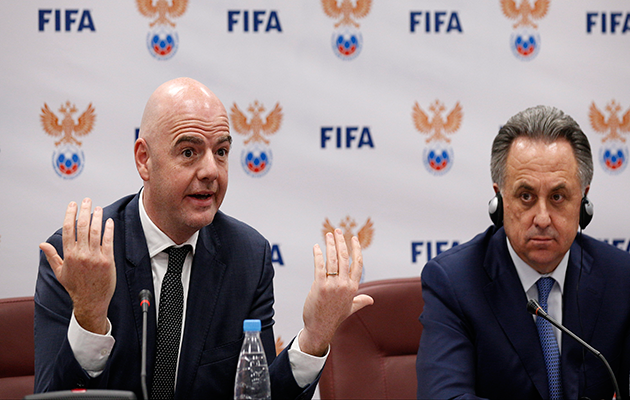Russian Sports Minister Vitaly Leontiyevich Mutko should be subject to investigation for FIFA ethics breaches, according to the World Anti-Doping Agency.
Major questions about Mutko, a long-time loyalist to President Vladimir Putin, were posed in the report delivered to WADA by Canadian Richard McLaren exposing the length, breadth and depth of the doping system and cover-up strategy organised under the watch of the 57-year-old.
A FIFA spokesperson said, in responso to McLaren’s report, that it “acknowledges the recommendations” and was requesting “all details concerning the individual cases of doping in Russian football.” Once FIFA had received this information it would “take the appropriate next steps.”
McLaren had reported evidence he considered “beyond reasonable doubt” that Russian sports and security officials had worked hand-in-hand to falsify positive dope tests in 30 sports, most notably athletics and weightlifting but including football.
The extra significance in the case of Mutko is that he is not only Sports Minister but a member of the governing councils and executive committees of world football federation FIFA and European body UEFA but also heads the Russian football federation as well as the local organising committee of the 2018 World Cup.
Indeed, the staging of the World Cup in Russia – secondary in scandal-laden innuendo until now behind Qatar 2022 – will be brought back into full focus by the Russian doping scandal.
Demands to remove the final from Russia are inevitable, particularly if the country – one of the most powerful in world sport – is barred from the Olympic Games being staged only next month in Rio de Janeiro.
McLaren, in a news conference after the publication of his report, said it was “inconceivable” that Mutko had not been aware of what was being undertaken in the name of Russian sporting ambition.
In one paragraph of his 110-age report he notes that Mutko in person had ‘saved’ a foreign footballer playing in Russia from discovery under the sophisticated system established which linked the incriminated state agencies to the Moscow anti-doping laboratory – a lab which had operating under the accredited approval of WADA itself.
The report also alleged an additional 11 positive tests of Russian players had been made to disappear between 2011 and 2015.
McLaren said, at the news conference, that during his investigation he had undertaken an interview with Mutko which had proved “singularly unhelpful.”
Following publication of the report WADA followed up with a series of seven recommendations which included:
The FIFA Ethics Committee to look into allegations concerning football and the role played by a member of its executive committee, Minister Vitaly Mutko.
Putin, according to news agency TASS, has ordered the suspension of all officials implicated “directly” by McLaren but this suggested that the urbane Mutko, a former president of Zenit St Petersburg, would survive in post, for the time being at least.
How FIFA’s ethics committee may react is another issue.
Russia’s dubious modus operandi in sports politics was ridiculed after a report produced by United States attorney Michael Garcia for FIFA into the 2018-2022 World Cup bidding scandal.
Mutko had chaired the Russian bid committee, had offered only scant help to Garcia’s inquiry, and refused access to documentation on the grounds that the hired computers had been returned to source and wiped of data.







